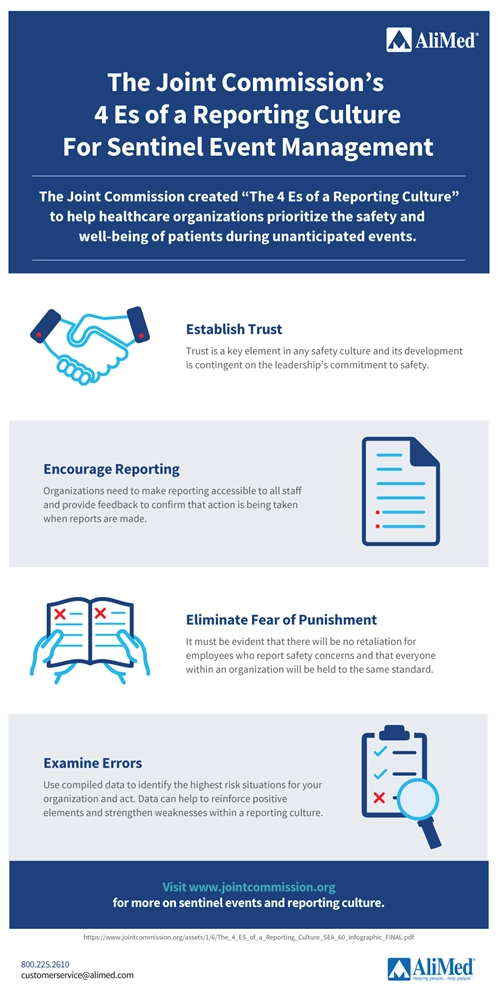Best Practices for Sentinel Events: What Every Healthcare Organization Needs to Know
In any healthcare environment, patient safety is always top of mind. Each staff member is responsible for their own actions. Administrators are too, especially when those actions include reacting to a safety concern raised by an employee. To ensure that healthcare organizations have a high-reliability culture, the Joint Commission Center for Transforming Healthcare published a report, “Sentinel Event Alert 60: Developing a Reporting Culture: Learning from Close Calls and Hazardous Conditions.” 1 The Joint Commission issued this report to encourage a reporting culture where swift action is taken to remedy unsafe conditions.
What Is a Sentinel Event?
The Joint Commission’s mission is “to continuously improve health care for the public, in collaboration with other stakeholders, by evaluating health care organizations and inspiring them to excel in providing safe and effective care of the highest quality and value.”2 The Joint Commission defines a sentinel event as an unanticipated event in a healthcare setting resulting in death or serious injury, physical or psychological, not related to natural causes or the patient’s illness. The Joint Commission identifies sentinel events in its accreditation policies to assist with root cause analysis and the development of new preventive measures. Accredited organizations are required to define sentinel events for their own care system and implement monitoring procedures and a process for root cause analysis.
Standards Must Be in Place to Respond to a Sentinel Event
Should a sentinel event occur, any accredited healthcare organization must have a process to respond. Causal factors need to be analyzed, focusing on the system holistically. An “action plan” should be put in place for potential improvements to decrease the chance of the event happening again. The Joint Commission encourages organizations to report any sentinel event, but it’s not required. The organization will have to create root cause analysis and an action plan within 45 days of the event. You can also consult with The Joint Commission on initiating the root cause analysis and action plan. If the event was due to a medical device defect, then an organization must report the incident to the Food and Drug Administration within 10 days.
There are benefits to reporting the event that can be of help to other organizations. A reported event is added to the database which other facilities have access to, providing vital information that could help to prevent a similar event from occurring at their organizations.
Sentinel Event Standards
Within the Performance Improvement and Leadership chapters of the accreditation manual, there are standards for the expectations regarding the internal identification and management of sentinel events.
With the organization’s definition of the sentinel event, it must include the specific events that would be reviewed under the Sentinel Event Policy. Following a sentinel event, the organization must begin its investigation by determining root cause analysis, then develop its plan and identify ways to reduce future risk. After the standards are implemented, they are closely monitored to ascertain their viability.
Reporting Is a Key Element of Sentinel Event Management
In order to manage sentinel events, your culture must be one that has adopted reporting. Only with reporting will you be able to truly understand the causes of a particular event and prevent similar events from happening again. The four Es of a Reporting Culture include:3
- Establish trust: there can be no culture of reporting without trust; leaders must show their continued commitment to safety and governance should support this as well.
- Encourage reporting: this means that reporting is accessible by all staff, easy to use, and delivers data analysis in a timely fashion. Encouragement also means that staff receives feedback so that they know the action is being taken when reports are made. The organization should also define the types of events that should be reported.
- Eliminate fear of punishment: ensure that your staff knows that there is no retaliation or punishment for reporting safety concerns. All staff, regardless of position, should be held to the same standards.
- Examine errors: refer to the data compiled and use it to identify the highest risk situations and take action. Data is also used to celebrate staff when they are successful. Data helps strengthen the safety program and the culture of reporting.
The Joint Commission also offers resources and support so you can continue to enhance a culture of reporting within your organization.4










